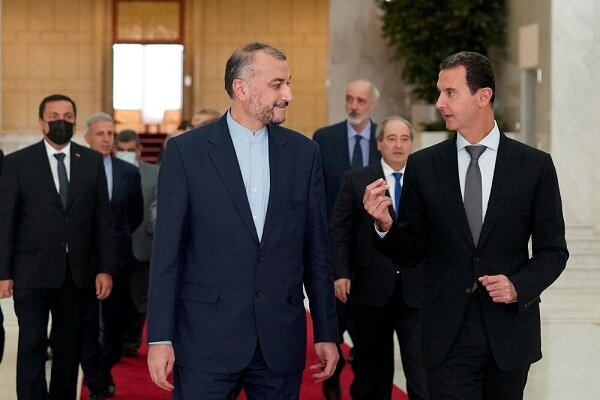But a resumption of ties between Syria and other Arab states is being recast as an attempt to curtail Iran’s deep influence in Syria despite the fact that Tehran has voiced support for a thaw in Syria-Arab ties.
These days, the Arab press is abuzz with speculations over the impacts of reviving Syria’s relations with certain Arab states on Tehran-Damascus ties.
The recent visit by United Arab Emirates Foreign Minister Sheikh Abdullah bin Zayed to Syria was the trigger for these speculations. After years of strained ties with Syria, the UAE reached out to the Syrian government in early November in a bid to improve relations. Sheikh Abdullah paid a surprise visit to Damascus and met with Syrian President Bashar Assad, the highest-level meeting in a decade.
The latest developments in the West Asia region and Syria, in addition to a number of regional and international issues of common interest, featured high during the meeting, according to a statement by the UAE foreign ministry. “The two sides also reviewed the prospects of enhancing relations between the two sisterly nations,” the statement said, adding, “The Syrian president reciprocated the greetings and underlined the strong bonds between the two fraternal nations. He also commended the objective positions adopted by the UAE.”
After Damascus, the top Emirati diplomat immediately traveled to Jordan, where he met with Jordanian King Abdullah II, an indication that regional issues were on the agenda of Emirati-Jordanian talks.
Concurrently, Arab media outlets reported that Jordan, together with the UAE, was working to normalize relations between Syria and other Arab states amid growing economic cooperation involving Amman, Damascus, and Beirut.
The Jordanian diplomatic push was evident when Sheikh Abdullah chose Amman as his next stop immediately after Damascus.
Talks of a thaw in Syria-Arab relations gave rise to years-old speculations about a possible crack in Tehran-Damascus ties encouraged by the so-called “moderate” Arab states in tandem with Russia.
Egyptian and Algerian efforts to bring Syria back to the Arab League have only exacerbated these speculations that are rooted in the belief that economic dividends stemming from Syria’s return to the pan-Arab organization and the overall promised Arab openness would be enough to cajole President Assad into giving up on his strong partnership with Tehran.
This is while Iran strongly supports Syria’s return to the Arab League and does not feel threatened by such a move. Iranian Foreign Minister Hossein Amir-Abdollahian even encourage Algeria to move ahead with its efforts regarding Syria.
In his recent phone conversation with Algerian Foreign Minister Ramtane Lamamra, Amir-Abdollahian expressed hope that the upcoming meeting of the Arab League will have important benefits for the Islamic ummah, according to the Iranian foreign ministry. The conversation took place after Sheikh Abdullah’s visit to Damascus, which indicates Iran’s confidence that the normalization of Syria-Arab ties wouldn’t come at a cost to those between Tehran and Damascus.
In fact, Iran and Syria have on several occasions underlined “strategic relations”. In October, Iranian Foreign Ministry spokesman Saeed Khatibzadeh praised Tehran-Damascus ties, noting that they have been elevated to a strategic level.
Commenting on a visit by Amir-Abdollahian to Damascus, Khatibzadeh said Iran-Syria relations have been upgraded to an important level. “Iran-Syria relations have entered a strategic phase. The dimensions of Iran-Syria relations are different, and the nature of strategic relations requires that these relations be established in all dimensions, including economic, cultural, military, and so on,” he said.
This view is also shared by the Syrian leadership. In mid-July, Syrian Foreign Minister Faisal Mekdad, receiving a delegation from the Iranian foreign ministry led by Assistant Foreign Minister of Iran Reza Najafi, stressed the depth of the “strategic relations” between Syria and Iran.
News media outlets affiliated with Saudi Arabia and the UAE, nevertheless, continue to spread unsubstantiated reports about the possibility of undermining Tehran-Damascus ties. One such report was published Sunday by Asharq Al Awsat, a Saudi-owned newspaper.
It said Arab states have two options regarding Syria. “The first is engaging Assad and ending Damascus' isolation with the hope of easing Iran's influence. The purpose would not be to immediately shift Syria from the ‘resistance alliance’, led by Iran, to the ‘moderate camp’. Rather, the aim is for Damascus to be open between the two camps,” the newspaper said, adding, “The second option lies in banking on the leadership of Russian President Vladimir Putin and his ability to rein in Iran.”
But these two options rest on two flawed assumptions. First, the Syrian leadership is ready to go along with what “moderate” Arab states would demand. Second, Russia is on the same page with these states in terms of undermining Iran’s clout in Syria.
Both assumptions are wrong. Because Syrian- Iranian relations are “strategic” and have been further strengthened during the years of war. Besides, President Assad is unlikely to forget who funded and supported rebels in Syria to topple the Syrian government. In the meantime, he is also unlikely to forget who stood beside him in times of crisis.
As for the second assumption, Iran-Russia interactions regarding Syria are always done in a cooperative atmosphere. And the two countries are now speaking of their cooperation in Syria as a role model to develop bilateral relations. This was evident during Amir-Abdollahian’s meeting with Russian Special Presidential Envoy on Syrian Reconciliation Alexander Lavrentiev on Sunday.
First published in Tehran Times

























Your Comment